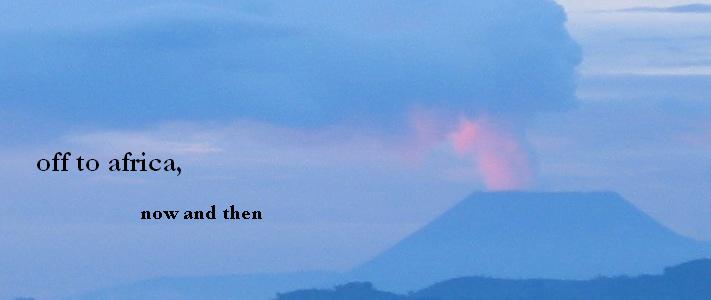The May 4 issue of the New Yorker had an article about Rwanda. When I heard about it, since I can't log in to the New Yorker site, I got a copy from a friend, and I have been reading the article in little chunks at the bus stop. It isn't that I couldn't read it all at once. I could. It's just that I don't want to be done reading it, done nodding at points to say, "Oh, yes. That was in 2003. I remember that." Today I found myself flipping back through, staring at the first photo, which is of a man in a bubblegum pink prison uniform, a genocidaire, gesturing in front of a table of gacaca judges, with a crowd around the fringe of the photo. I was staring at the crowd, at faces that are so familiar to me, poses that I know so well.
It's not true, the way they talk about AFF-rica as if it is one big uniform place. You know that; I know you know. Staring at that photo, I knew that what I was seeing was unmistakeably Rwanda, the way I sometimes see a person on the street and know that he's from Uganda, or just across the border in Kenya, the way I sometimes want to greet a man on the bus in Nuer, because I know he's from Southern Sudan. Even the expressions are Rwandese, in a way that I cannot explain but I can see. I have seen those same expressions a hundred, a thousand times in Rwanda, and nowhere else.
Soon after I arrived in Rwanda, maybe in early 2003, I was driving through Kibuye with a colleague, past the old prison in the center of town, as a group of prisoners left for their day of work. There were 25 or 30 of them, with woman trailing behind in an army uniform. "Look at that," my colleague scoffed. "There's no security. Just one little woman with a Kalashnikov. There's no security at all." (She was, in fact, not a very tall woman.)
Every now and again, that phrase runs back through my head. "Just one little woman with a Kalashnikov."
Unrelated photo:
It's not true, the way they talk about AFF-rica as if it is one big uniform place. You know that; I know you know. Staring at that photo, I knew that what I was seeing was unmistakeably Rwanda, the way I sometimes see a person on the street and know that he's from Uganda, or just across the border in Kenya, the way I sometimes want to greet a man on the bus in Nuer, because I know he's from Southern Sudan. Even the expressions are Rwandese, in a way that I cannot explain but I can see. I have seen those same expressions a hundred, a thousand times in Rwanda, and nowhere else.
Soon after I arrived in Rwanda, maybe in early 2003, I was driving through Kibuye with a colleague, past the old prison in the center of town, as a group of prisoners left for their day of work. There were 25 or 30 of them, with woman trailing behind in an army uniform. "Look at that," my colleague scoffed. "There's no security. Just one little woman with a Kalashnikov. There's no security at all." (She was, in fact, not a very tall woman.)
Every now and again, that phrase runs back through my head. "Just one little woman with a Kalashnikov."
Unrelated photo:


1 comment:
You put that perfectly, something unmistakeably Rwanda - things that are so specifically Rwandese you see them everywhere when you are there and nowhere when you are not. Little things - the tilt of a head, the rhythm in a walk, a facial expression... I can still picture, crystal clear, things like that and I can recognize them in people I see here. Without hearing a name, without knowing a thing about them, I find I can always seek out Rwandese (few that there are in my area).
Post a Comment